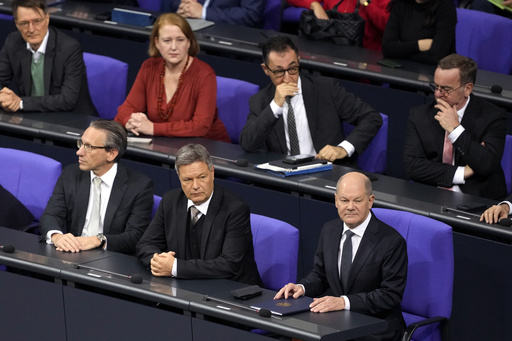BERLIN — Chancellor Olaf Scholz faced a significant defeat in a confidence vote within the German parliament on Monday, setting the path for the European Union’s largest country and economy to potentially hold an early election in February.
Scholz secured the backing of only 207 out of the 733 members of the Bundestag, while 394 opposed him and 116 chose to abstain, falling well below the required majority of 367 votes.
Since his coalition government, consisting of three parties, disintegrated on November 6 following a dispute about economic strategy that led to the dismissal of his finance minister, Scholz has been leading a minority government. Subsequently, various major political leaders expressed their consensus to call for a parliamentary election on February 23, which is seven months ahead of the initial schedule.
The confidence vote is necessitated by the post-World War II constitutional stipulation that prevents the Bundestag from dissolving itself. Now, it falls upon President Frank-Walter Steinmeier to make the pivotal decision regarding the dissolution of parliament and the calling of an election.
Steinmeier has a 21-day window to determine this course of action and is anticipated to announce his decision after the Christmas holiday, given the timing of the upcoming election. Once parliament is disbanded, the election must occur within a two-month timeframe.
Campaigning has, in essence, already begun, which was evident in Monday’s three-hour debate.
Scholz, representing the center-left Social Democrats, articulated to his fellow lawmakers that the upcoming election would be critical in defining the country’s future. He posed the question of whether Germany, as a robust nation, would make significant investments in its future, or risk jeopardizing its national cohesion and economic prosperity by postponing necessary financial commitments.
In his address, Scholz made promises to “modernize” Germany’s stringent debt management regulations, raise the national minimum wage, and lower value-added taxes on food.
Friedrich Merz, the center-right challenger, countered by emphasizing that the current economic struggles facing the country are among the most severe since World War II, accusing Scholz of taking a complacent approach. He criticized the chancellor for neglecting discussions on the competitiveness of the German economy in his speech.
Scholz referenced Germany’s role as Ukraine’s primary military supplier in Europe, reaffirming his commitment to continue that support, although he made it clear that he would not authorize the supply of long-range Taurus cruise missiles due to concerns about escalating tensions with Russia. He emphasized, “We will do nothing that jeopardizes our own security.”
Conversely, Merz, who has expressed support for supplying the long-range missiles, stated that Scholz’s party should not lecture about the realities of war and peace. However, he acknowledged a shared interest among political rivals in ending the conflict in Ukraine swiftly.
Current opinion polls indicate that Scholz’s party is trailing behind Merz’s opposition Union bloc, while Vice Chancellor Robert Habeck of the Green party, the last member of Scholz’s coalition, is also vying for leadership, despite his party’s lower standings.
The far-right Alternative for Germany has put forward Alice Weidel as a candidate for chancellor, although prospects for her success are slim since other parties have firmly refused to collaborate with it.
Germany’s electoral structure typically necessitates coalition formations, and current polling data reflect that no single party is close to achieving an independent majority. Following the election, it is expected that there will be an extended period of negotiations to establish a new government.
Confidence votes are uncommon in Germany, a nation of approximately 83 million that values stability. This incident marks just the sixth occurrence of such a vote in the nation’s postwar legacy. The most recent confidence vote took place in 2005, when then-Chancellor Gerhard Schröder orchestrated an early election narrowly won by center-right opponent Angela Merkel.
